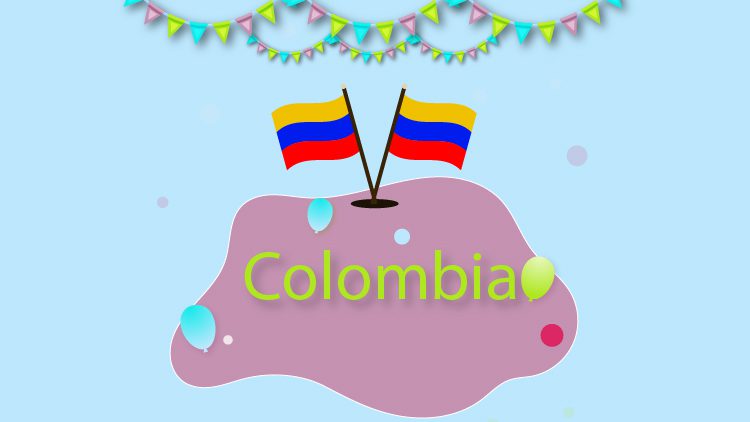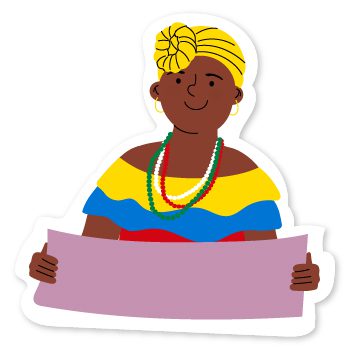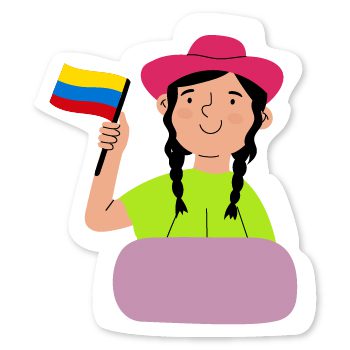
Does Colombia Speak Spanish?
Overview of Colombia’s Language
Colombia, like many other countries in South America, is primarily a Spanish-speaking nation. Spanish arrived in Colombia in the 16th century when the Spanish conquistadors colonized Latin America. Since then, Spanish has become the primary and everyday language spoken nationwide. Colombian Spanish is part of the Spanish dialects expressed in Central and South America, belonging to the Spanish language family. However, it’s important to note that Colombia is home to many indigenous people who still speak their native language. Around 70 different Amerindian languages are spoken in Colombia, which shows the country’s cultural and linguistic diversity. One such example is the Colombian language, which is a native language spoken by the indigenous people of Santa Catalina. Although Spanish is the country’s primary language, these indigenous languages are essential to Colombian culture.
As a result of this linguistic diversity, it’s not uncommon to come across Colombian people who speak more than one language. Some Columbian people might have grown up speaking their native language at home while also learning Spanish in school or from friends and family. Overall, the language situation in Colombia is complex and diverse, which adds to the country’s rich culture.


History of Spanish in Colombia
Like many other American countries, Colombia was initially inhabited by indigenous people who spoke their native languages. When the Spanish colonizers arrived in the 16th century, they introduced their language to the land, and Spanish became the dominant language. Spanish speakers started spreading in Colombia as a result of the colonization process. By the end of the 17th century, it was the language of the elite and the colony’s official language.
After Colombia gained independence from Spain in 1810, Spanish maintained its official status and became the language of politics, education, and commerce. However, it was only in the early 20th century that Spanish became the dominant language spoken by most of the population. Before that, many Colombians still spoke indigenous languages or African dialects.
Today, almost all Colombian people speak Spanish, the only official language in the country. Although Spanish has been the dominant language in Colombia for centuries, the Colombian government has recognized the importance of preserving and promoting indigenous languages, and some of them have official status in specific regions of the country. In addition, other languages are also spoken in Colombia, such as English, Portuguese, French, and Italian.
Overall, the history of Spanish in Colombia is closely tied to the country’s colonial past, but it has also evolved to reflect the diversity of its population and culture. Speaking Spanish is essential for anyone living or traveling in Colombia, as it facilitates communication and cultural understanding. However, learning about other languages and cultures can enrich one’s experience and appreciation of Colombia’s rich heritage.
Current status of Spanish in Colombia
Spanish is the official language of Colombia and the mother tongue of approximately 99% of the population. The Spanish colonizers introduced it during the 16th century, and since then, it has been the primary language of communication in the country.
However, despite being the dominant language, there are variations in how Spanish is spoken in different regions of Colombia. For example, in the Caribbean coast, the accent is influenced by the English-speaking Caribbean islands, while in the Andean region, the accent is more neutral. Similarly, some unique Colombian words and phrases are not commonly used in other Spanish-speaking countries. It is important to note that Colombia is not the only country in Latin America that speaks Spanish. Many other countries in the region, including Mexico, Argentina, and Central America, also speak Spanish, although there may be differences in the accent and vocabulary. Despite the prevalence of Spanish, many indigenous languages are still expressed in Colombia. These languages are spoken by approximately 4.4% of the population and are recognized as official languages in some regions of the country.
While Spanish is the dominant language in Colombia, it is essential to acknowledge the presence of other languages in the country and to respect and preserve the cultural heritage of Indigenous people who still speak their native languages. As a visitor to Colombia, learning some basic Spanish phrases can significantly enhance your travel experience and help you communicate more effectively with the locals.


Other Important Languages Are
In addition to Spanish, Colombia is home to over 68 indigenous languages. These languages are spoken by Indigenous People, who make up about 3.4% of the population. Some of Colombia’s most widely spoken indigenous languages include Quechua, Wayuu, and Nasa Yuwe. These languages have survived despite colonialism and attempts to eradicate them.
However, many indigenous languages in Colombia risk extinction due to cultural assimilation, loss of ancestral lands, and lack of government support. As a result, efforts are being made to preserve and promote these languages.
In addition to indigenous languages, Colombia has communities that speak Creole languages, such as Palenquero, which Afro-Colombians speak in San Basilio de Palenque.
Overall, the diversity of languages in Colombia reflects the country’s rich cultural heritage and underscores the importance of promoting language preservation and learning.
Linguistic Tapestry of Colombia
In the Republic of Colombia, Spanish is the major language and the most popular language spoken by the majority of the population. However, the nation’s linguistic diversity extends to many common languages spoken by various communities. Indigenous languages, such as Quechua and Wayuu, along with immigrant languages, contribute to the vibrant mosaic of Colombian linguistic life.
The Colombian people, with their rich cultural heritage, have embraced this diversity. From the Amazon rainforest to urban centers like Bogotá, the multitude of languages spoken reflects the country’s complex history and cultural evolution. The coexistence of these languages demonstrates the resilience and adaptability of the Colombian people, who maintain their unique identities while also integrating into the broader national framework.
Cultural and Linguistic Diversity in Colombia
Throughout its history, Colombia has been shaped by a multitude of cultural influences, ranging from pre-Columbian indigenous traditions to colonial Spanish and African legacies. These diverse cultural influences are reflected not only in Colombia’s language but also in its art, music, cuisine, and customs. Colombian artists, for instance, draw inspiration from a rich tapestry of traditions, blending indigenous, European, and African elements into their works.
The Colombian mainland boasts a fascinating linguistic landscape, where Spanish serves as the predominant language of communication. However, the country’s linguistic diversity extends beyond Spanish, encompassing a myriad of indigenous and minority languages spoken by native communities across the nation.
Along the Caribbean coast, the linguistic landscape is further enriched by the influence of Caribbean dialects, owing to historical ties with neighboring islands such as Jamaica and Cuba. This unique blend of Spanish and Caribbean influences gives rise to a distinct linguistic flavor, characterized by vibrant rhythms and colorful expressions.
Importance of learning Spanish in Colombia
While various languages are spoken in Colombia, Spanish is the most commonly used. For those who plan to visit or live in Colombia, it’s essential to learn Spanish to fully immerse yourself in the culture and communicate effectively with locals. Learning Spanish in Colombia can also open up opportunities for employment and business ventures. In a country where Spanish is the dominant language, speaking it fluently can set you apart and demonstrate your commitment to understanding and respecting Colombian culture.
Furthermore, learning Spanish can also help bridge the gap between the country’s Indigenous and non-Indigenous communities. However, they also often speak Spanish as a second language, making it an essential tool for communication and understanding between these two groups.
Finally, learning Spanish in Colombia can be a profoundly enriching experience. It provides the opportunity to learn about the language’s history and cultural significance and to connect with locals on a deeper level. Becoming fluent in Spanish can help visitors and residents better appreciate and understand this vibrant and diverse country.
Multicultural Linguistic Influences in Colombia
In the Colombian Department of San Andrés and Providencia, a Creole language known as San Andrés Creole is spoken alongside Spanish. This creole language, which emerged from the interaction between African slaves, indigenous peoples, and European settlers, reflects the multicultural heritage of the region.
In addition to Western influences, Colombia’s linguistic landscape also bears traces of Eastern influences, particularly in terms of loanwords and cultural exchange. From culinary terms to religious practices, Eastern influences have contributed to the rich tapestry of Colombian culture and language.
While Spanish is the most widely spoken language in present-day Colombia, it is important to acknowledge the presence of native speakers of indigenous languages and minority languages. These native speakers play a vital role in preserving Colombia’s linguistic heritage and cultural diversity.
Indigenous and African Linguistic Heritage
The Santa Catalina Islands, located off the coast of Colombia, are home to indigenous communities that have retained their ancestral languages despite centuries of external influences. The language spoken on the Santa Catalina Islands, known as the Colombian language, is a testament to the resilience of indigenous cultures in the face of colonization.
Colombian people, with their diverse backgrounds and experiences, contribute to the rich linguistic tapestry of the nation. Whether they hail from indigenous communities in the Amazon rainforest or urban centers like Bogotá and Medellín, Colombian people bring their unique linguistic heritage to the collective identity of the country.
The African influence on Colombian culture and language can be traced back to the colonial era when African slaves were forcibly brought to the region. Today, African influences are evident in Colombian music, dance, cuisine, and language, enriching the country’s cultural mosaic.
Immigrant and Religious Language Influences
In addition to Spanish and indigenous languages, Colombia is home to various minority languages spoken by immigrant communities from around the world. These languages, ranging from Arabic and Chinese to Italian and Portuguese, reflect Colombia’s status as a multicultural melting pot.
According to the National Administrative Department of Statistics, Colombia’s linguistic diversity is recognized as a reflection of its multicultural society. In a 2019 report by the Financial Times, Colombia was hailed as one of the most linguistically diverse countries in Latin America, with over 68 indigenous languages and numerous immigrant languages spoken across its territory.
As a predominantly Catholic country, Colombia’s linguistic landscape is also influenced by religious vocabulary and traditions. Catholicism, introduced by Spanish colonizers, has left an indelible mark on Colombian culture, shaping not only language but also customs, holidays, and social norms.
American Influence on Colombian Language
The influence of American dialects, particularly from the United States, has had a huge impact on contemporary Colombian culture and language. This is evident in the increasing use of English, especially among younger generations and in business contexts. English has become one of the more common languages learned by Colombians, often used in education and international trade, further connecting Colombia with the global community.
Historically, the United States of Colombia, the name used during the 19th century, laid the groundwork for the modern nation. The transition to the Republic of Colombia marked a new era of national identity and unity, where Spanish solidified its role as the unifying language, while the country continued to celebrate its linguistic diversity. This blend of languages and huge influence of culture has shaped Colombia into a dynamic and inclusive society.
Can I learn Spanish while in Colombia?
Yes, Colombia is a great place to learn Spanish. Many language schools and immersion programs are available throughout the country, particularly in cities like Bogotá, Medellín, and Cartagena.
How widely is Spanish spoken in Colombia?
Spanish is widely spoken and understood throughout Colombia. It is the language used in government, education, media, and everyday communication among Colombians.
Do people in Colombia speak English?
While English is not as widely spoken as Spanish, a growing number of Colombians speak English, especially in urban areas, tourist destinations, and among younger generations. English proficiency varies among individuals.
Can I get by with just English in Colombia?
It is recommended to have some basic knowledge of Spanish when visiting Colombia, as it will significantly enhance your ability to communicate and navigate the country. However, you may find people who can communicate in English in tourist areas, hotels, and major cities.
Are there Spanish language courses available for foreigners in Colombia?
Absolutely! Colombia has numerous language institutes and universities that offer Spanish courses specifically designed for foreigners. These courses cater to different proficiency levels, from beginner to advanced.
